The Classic Sci-Fi Collection Read online
Page 26
“I can conceive it,” replied Edith, meditatively, “and I think we ought all to be thankful that it is so, for it will save you much suffering, I am sure.”
“Imagine,” I said, in an effort to explain, as much to myself as to her, the strangeness of my mental condition, “that a man first heard of a bereavement many, many years, half a lifetime perhaps, after the event occurred. I fancy his feeling would be perhaps something as mine is. When I think of my friends in the world of that former day, and the sorrow they must have felt for me, it is with a pensive pity, rather than keen anguish, as of a sorrow long, long ago ended.”
“You have told us nothing yet of your friends,” said Edith. “Had you many to mourn you?”
“Thank God, I had very few relatives, none nearer than cousins,” I replied. “But there was one, not a relative, but dearer to me than any kin of blood. She had your name. She was to have been my wife soon. Ah me!”
“Ah me!” sighed the Edith by my side. “Think of the heartache she must have had.”
Something in the deep feeling of this gentle girl touched a chord in my benumbed heart. My eyes, before so dry, were flooded with the tears that had till now refused to come. When I had regained my composure, I saw that she too had been weeping freely.
“God bless your tender heart,” I said. “Would you like to see her picture?”
A small locket with Edith Bartlett’s picture, secured about my neck with a gold chain, had lain upon my breast all through that long sleep, and removing this I opened and gave it to my companion. She took it with eagerness, and after poring long over the sweet face, touched the picture with her lips.
“I know that she was good and lovely enough to well deserve your tears,” she said; “but remember her heartache was over long ago, and she has been in heaven for nearly a century.”
It was indeed so. Whatever her sorrow had once been, for nearly a century she had ceased to weep, and, my sudden passion spent, my own tears dried away. I had loved her very dearly in my other life, but it was a hundred years ago! I do not know but some may find in this confession evidence of lack of feeling, but I think, perhaps, that none can have had an experience sufficiently like mine to enable them to judge me. As we were about to leave the chamber, my eye rested upon the great iron safe which stood in one corner. Calling my companion’s attention to it, I said:
“This was my strong room as well as my sleeping room. In the safe yonder are several thousand dollars in gold, and any amount of securities. If I had known when I went to sleep that night just how long my nap would be, I should still have thought that the gold was a safe provision for my needs in any country or any century, however distant. That a time would ever come when it would lose its purchasing power, I should have considered the wildest of fancies. Nevertheless, here I wake up to find myself among a people of whom a cartload of gold will not procure a loaf of bread.”
As might be expected, I did not succeed in impressing Edith that there was anything remarkable in this fact. “Why in the world should it?” she merely asked.
CHAPTER 21
It had been suggested by Dr. Leete that we should devote the next morning to an inspection of the schools and colleges of the city, with some attempt on his own part at an explanation of the educational system of the twentieth century.
“You will see,” said he, as we set out after breakfast, “many very important differences between our methods of education and yours, but the main difference is that nowadays all persons equally have those opportunities of higher education which in your day only an infinitesimal portion of the population enjoyed. We should think we had gained nothing worth speaking of, in equalizing the physical comfort of men, without this educational equality.”
“The cost must be very great,” I said.
“If it took half the revenue of the nation, nobody would grudge it,” replied Dr. Leete, “nor even if it took it all save a bare pittance. But in truth the expense of educating ten thousand youth is not ten nor five times that of educating one thousand. The principle which makes all operations on a large scale proportionally cheaper than on a small scale holds as to education also.”
“College education was terribly expensive in my day,” said I.
“If I have not been misinformed by our historians,” Dr. Leete answered, “it was not college education but college dissipation and extravagance which cost so highly. The actual expense of your colleges appears to have been very low, and would have been far lower if their patronage had been greater. The higher education nowadays is as cheap as the lower, as all grades of teachers, like all other workers, receive the same support. We have simply added to the common school system of compulsory education, in vogue in Massachusetts a hundred years ago, a half dozen higher grades, carrying the youth to the age of twenty-one and giving him what you used to call the education of a gentleman, instead of turning him loose at fourteen or fifteen with no mental equipment beyond reading, writing, and the multiplication table.”
“Setting aside the actual cost of these additional years of education,” I replied, “we should not have thought we could afford the loss of time from industrial pursuits. Boys of the poorer classes usually went to work at sixteen or younger, and knew their trade at twenty.”
“We should not concede you any gain even in material product by that plan,” Dr. Leete replied. “The greater efficiency which education gives to all sorts of labor, except the rudest, makes up in a short period for the time lost in acquiring it.”
“We should also have been afraid,” said I, “that a high education, while it adapted men to the professions, would set them against manual labor of all sorts.”
“That was the effect of high education in your day, I have read,” replied the doctor; “and it was no wonder, for manual labor meant association with a rude, coarse, and ignorant class of people. There is no such class now. It was inevitable that such a feeling should exist then, for the further reason that all men receiving a high education were understood to be destined for the professions or for wealthy leisure, and such an education in one neither rich nor professional was a proof of disappointed aspirations, an evidence of failure, a badge of inferiority rather than superiority. Nowadays, of course, when the highest education is deemed necessary to fit a man merely to live, without any reference to the sort of work he may do, its possession conveys no such implication.”
“After all,” I remarked, “no amount of education can cure natural dullness or make up for original mental deficiencies. Unless the average natural mental capacity of men is much above its level in my day, a high education must be pretty nearly thrown away on a large element of the population. We used to hold that a certain amount of susceptibility to educational influences is required to make a mind worth cultivating, just as a certain natural fertility in soil is required if it is to repay tilling.”
“Ah,” said Dr. Leete, “I am glad you used that illustration, for it is just the one I would have chosen to set forth the modern view of education. You say that land so poor that the product will not repay the labor of tilling is not cultivated. Nevertheless, much land that does not begin to repay tilling by its product was cultivated in your day and is in ours. I refer to gardens, parks, lawns, and, in general, to pieces of land so situated that, were they left to grow up to weeds and briers, they would be eyesores and inconveniencies to all about. They are therefore tilled, and though their product is little, there is yet no land that, in a wider sense, better repays cultivation. So it is with the men and women with whom we mingle in the relations of society, whose voices are always in our ears, whose behavior in innumerable ways affects our enjoyment—who are, in fact, as much conditions of our lives as the air we breathe, or any of the physical elements on which we depend. If, indeed, we could not afford to educate everybody, we should choose the coarsest and dullest by nature, rather than the brightest, to receive what education we could give. The naturally refined and intellectual can better dispense with aids to culture than those le
ss fortunate in natural endowments.
“To borrow a phrase which was often used in your day, we should not consider life worth living if we had to be surrounded by a population of ignorant, boorish, coarse, wholly uncultivated men and women, as was the plight of the few educated in your day. Is a man satisfied, merely because he is perfumed himself, to mingle with a malodorous crowd? Could he take more than a very limited satisfaction, even in a palatial apartment, if the windows on all four sides opened into stable yards? And yet just that was the situation of those considered most fortunate as to culture and refinement in your day. I know that the poor and ignorant envied the rich and cultured then; but to us the latter, living as they did, surrounded by squalor and brutishness, seem little better off than the former. The cultured man in your age was like one up to the neck in a nauseous bog solacing himself with a smelling bottle. You see, perhaps, now, how we look at this question of universal high education. No single thing is so important to every man as to have for neighbors intelligent, companionable persons. There is nothing, therefore, which the nation can do for him that will enhance so much his own happiness as to educate his neighbors. When it fails to do so, the value of his own education to him is reduced by half, and many of the tastes he has cultivated are made positive sources of pain.
“To educate some to the highest degree, and leave the mass wholly uncultivated, as you did, made the gap between them almost like that between different natural species, which have no means of communication. What could be more inhuman than this consequence of a partial enjoyment of education! Its universal and equal enjoyment leaves, indeed, the differences between men as to natural endowments as marked as in a state of nature, but the level of the lowest is vastly raised. Brutishness is eliminated. All have some inkling of the humanities, some appreciation of the things of the mind, and an admiration for the still higher culture they have fallen short of. They have become capable of receiving and imparting, in various degrees, but all in some measure, the pleasures and inspirations of a refined social life. The cultured society of the nineteenth century—what did it consist of but here and there a few microscopic oases in a vast, unbroken wilderness? The proportion of individuals capable of intellectual sympathies or refined intercourse, to the mass of their contemporaries, used to be so infinitesimal as to be in any broad view of humanity scarcely worth mentioning. One generation of the world to-day represents a greater volume of intellectual life than any five centuries ever did before.
“There is still another point I should mention in stating the grounds on which nothing less than the universality of the best education could now be tolerated,” continued Dr. Leete, “and that is, the interest of the coming generation in having educated parents. To put the matter in a nutshell, there are three main grounds on which our educational system rests: first, the right of every man to the completest education the nation can give him on his own account, as necessary to his enjoyment of himself; second, the right of his fellow-citizens to have him educated, as necessary to their enjoyment of his society; third, the right of the unborn to be guaranteed an intelligent and refined parentage.”
I shall not describe in detail what I saw in the schools that day. Having taken but slight interest in educational matters in my former life, I could offer few comparisons of interest. Next to the fact of the universality of the higher as well as the lower education, I was most struck with the prominence given to physical culture, and the fact that proficiency in athletic feats and games as well as in scholarship had a place in the rating of the youth.
“The faculty of education,” Dr. Leete explained, “is held to the same responsibility for the bodies as for the minds of its charges. The highest possible physical, as well as mental, development of every one is the double object of a curriculum which lasts from the age of six to that of twenty-one.”
The magnificent health of the young people in the schools impressed me strongly. My previous observations, not only of the notable personal endowments of the family of my host, but of the people I had seen in my walks abroad, had already suggested the idea that there must have been something like a general improvement in the physical standard of the race since my day, and now, as I compared these stalwart young men and fresh, vigorous maidens with the young people I had seen in the schools of the nineteenth century, I was moved to impart my thought to Dr. Leete. He listened with great interest to what I said.
“Your testimony on this point,” he declared, “is invaluable. We believe that there has been such an improvement as you speak of, but of course it could only be a matter of theory with us. It is an incident of your unique position that you alone in the world of to-day can speak with authority on this point. Your opinion, when you state it publicly, will, I assure you, make a profound sensation. For the rest it would be strange, certainly, if the race did not show an improvement. In your day, riches debauched one class with idleness of mind and body, while poverty sapped the vitality of the masses by overwork, bad food, and pestilent homes. The labor required of children, and the burdens laid on women, enfeebled the very springs of life. Instead of these maleficent circumstances, all now enjoy the most favorable conditions of physical life; the young are carefully nurtured and studiously cared for; the labor which is required of all is limited to the period of greatest bodily vigor, and is never excessive; care for one’s self and one’s family, anxiety as to livelihood, the strain of a ceaseless battle for life—all these influences, which once did so much to wreck the minds and bodies of men and women, are known no more. Certainly, an improvement of the species ought to follow such a change. In certain specific respects we know, indeed, that the improvement has taken place. Insanity, for instance, which in the nineteenth century was so terribly common a product of your insane mode of life, has almost disappeared, with its alternative, suicide.”
CHAPTER 22
We had made an appointment to meet the ladies at the dining-hall for dinner, after which, having some engagement, they left us sitting at table there, discussing our wine and cigars with a multitude of other matters.
“Doctor,” said I, in the course of our talk, “morally speaking, your social system is one which I should be insensate not to admire in comparison with any previously in vogue in the world, and especially with that of my own most unhappy century. If I were to fall into a mesmeric sleep tonight as lasting as that other and meanwhile the course of time were to take a turn backward instead of forward, and I were to wake up again in the nineteenth century, when I had told my friends what I had seen, they would every one admit that your world was a paradise of order, equity, and felicity. But they were a very practical people, my contemporaries, and after expressing their admiration for the moral beauty and material splendor of the system, they would presently begin to cipher and ask how you got the money to make everybody so happy; for certainly, to support the whole nation at a rate of comfort, and even luxury, such as I see around me, must involve vastly greater wealth than the nation produced in my day. Now, while I could explain to them pretty nearly everything else of the main features of your system, I should quite fail to answer this question, and failing there, they would tell me, for they were very close cipherers, that I had been dreaming; nor would they ever believe anything else. In my day, I know that the total annual product of the nation, although it might have been divided with absolute equality, would not have come to more than three or four hundred dollars per head, not very much more than enough to supply the necessities of life with few or any of its comforts. How is it that you have so much more?”
“That is a very pertinent question, Mr. West,” replied Dr. Leete, “and I should not blame your friends, in the case you supposed, if they declared your story all moonshine, failing a satisfactory reply to it. It is a question which I cannot answer exhaustively at any one sitting, and as for the exact statistics to bear out my general statements, I shall have to refer you for them to books in my library, but it would certainly be a pity to leave you to be put to confusion by your old ac
quaintances, in case of the contingency you speak of, for lack of a few suggestions.
“Let us begin with a number of small items wherein we economize wealth as compared with you. We have no national, state, county, or municipal debts, or payments on their account. We have no sort of military or naval expenditures for men or materials, no army, navy, or militia. We have no revenue service, no swarm of tax assessors and collectors. As regards our judiciary, police, sheriffs, and jailers, the force which Massachusetts alone kept on foot in your day far more than suffices for the nation now. We have no criminal class preying upon the wealth of society as you had. The number of persons, more or less absolutely lost to the working force through physical disability, of the lame, sick, and debilitated, which constituted such a burden on the able-bodied in your day, now that all live under conditions of health and comfort, has shrunk to scarcely perceptible proportions, and with every generation is becoming more completely eliminated.
“Another item wherein we save is the disuse of money and the thousand occupations connected with financial operations of all sorts, whereby an army of men was formerly taken away from useful employments. Also consider that the waste of the very rich in your day on inordinate personal luxury has ceased, though, indeed, this item might easily be over-estimated. Again, consider that there are no idlers now, rich or poor—no drones.
“A very important cause of former poverty was the vast waste of labor and materials which resulted from domestic washing and cooking, and the performing separately of innumerable other tasks to which we apply the cooperative plan.
“A larger economy than any of these—yes, of all together—is effected by the organization of our distributing system, by which the work done once by the merchants, traders, storekeepers, with their various grades of jobbers, wholesalers, retailers, agents, commercial travelers, and middlemen of all sorts, with an excessive waste of energy in needless transportation and interminable handlings, is performed by one tenth the number of hands and an unnecessary turn of not one wheel. Something of what our distributing system is like you know. Our statisticians calculate that one eightieth part of our workers suffices for all the processes of distribution which in your day required one eighth of the population, so much being withdrawn from the force engaged in productive labor.”

 Anthem
Anthem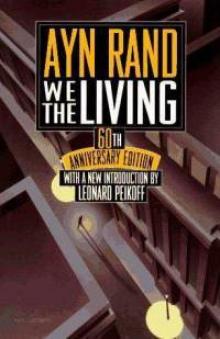 We the Living
We the Living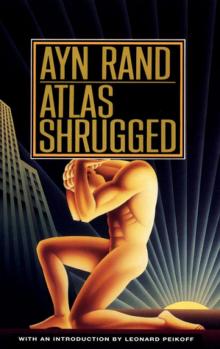 Atlas Shrugged
Atlas Shrugged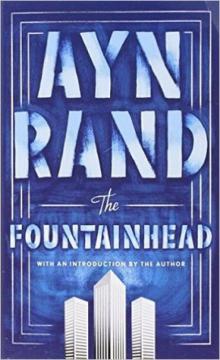 The Fountainhead
The Fountainhead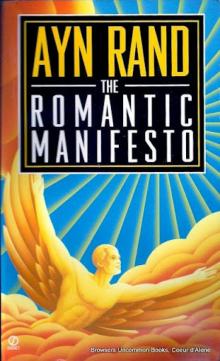 The Romantic Manifesto: A Philosophy of Literature
The Romantic Manifesto: A Philosophy of Literature The Classic Sci-Fi Collection
The Classic Sci-Fi Collection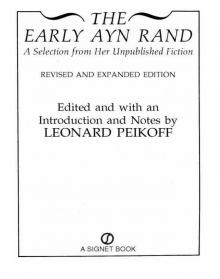 The Early Ayn Rand
The Early Ayn Rand